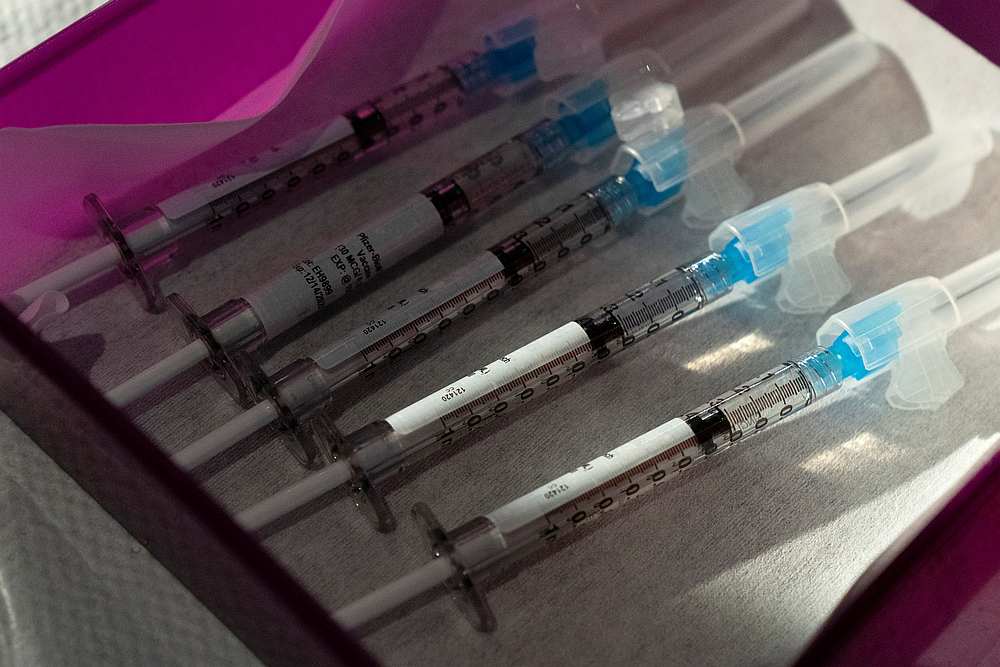SINGAPORE, May 11 — The benefits of the two Covid-19 vaccines approved here continue to outweigh the risks, even as intense studies into infections of vaccinated persons and new coronavirus variants are under way, Health Minister Gan Kim Yong said today (May 11).
“We knew from the start that vaccinations are not 100 per cent efficacious, but they prevent severe reactions to the infections and are likely to reduce onward transmission,” Mr Gan said in a ministerial statement in Parliament on the Covid-19 situation.
Gan, who will on Saturday hand over his health portfolio to Ong Ye Kung, said that he will stay as co-chair of the government’s Covid-19 task force, even as he becomes Trade and Industry Minister. This means there will be three co-chairs, the others being Ong and Education Minister Lawrence Wong, who will become Finance Minister under the latest Cabinet reshuffle.
As of Sunday, about 1.8 million people in Singapore have received one dose of either the Pfizer-BioNTech or Moderna vaccine. About 1.2 million among them have been given both doses.
Two-thirds of eligible persons aged 45 and older have received the vaccine, or have booked their appointments, Gan said.
“We will be inviting subsequent age bands to receive vaccinations from the latter half of May.
“However, as vaccine supplies continue to be limited, vaccinations will be progressively extended in smaller age bands,” he said.
The vaccination exercise will be completed by year-end if supplies arrive as scheduled, said Gan.
He urged Singaporeans to encourage others, especially seniors, to be vaccinated. His call comes in the face of recent Covid-19 cases and clusters involving vaccinated persons or those who had recovered from past infections.
Infections of vaccinated persons
Giving an update on Singapore’s largest active Covid-19 cluster at Tan Tock Seng Hospital with 43 infections, Gan said that seven staff members and two patients had received both doses of the vaccine. They showed no or mild symptoms, and did not need oxygen support.
By contrast, of the 34 individuals who were not fully vaccinated, six needed oxygen, two are under intensive care and one has died from complications due to coronavirus.
“While the numbers are too small to draw firm conclusions, the findings do indicate that vaccination provides critical protection even against Covid-19 variants,” Gan said.
As of yesterday, there were 30 locally transmitted cases and 24 imported infections involving fully vaccinated persons.
More than half of these local cases did not show symptoms (57 per cent), and none had severe illness needing more intensive care.
This is consistent with international experience and emerging evidence that vaccines are highly effective in guarding against severe forms of Covid-19 and are likely to reduce transmission risks, Mr Gan said.
Another 26 cases were reinfections — people who had been infected before and recovered, which means they would likely have the antibodies needed to fight coronavirus.
Gan said that the authorities were still investigating whether these reinfections were due to “general waning immunity over time or lack of cross-protection against specific variants of Covid-19 that the individual is naive to”.
Protection against new variants
Of late, one area of concern is the emergence of new coronavirus variants that may surface from time to time.
Based on DNA sequencing of the TTSH cases, the B16172 mutant strain, which surfaced in India, is believed to be behind the infections.
The authorities said last week that five patients with this variant were part of the hospital cluster.
Gan said that the strain appears to be very infectious and there will be other variants like it.
“It reminded us that vaccines are not a guarantee against infection. But vaccines can help to prevent severe illness,” he emphasised again.
“Vaccines can also reduce risk of further transmission, but the extent of this is still being studied.”
Ultimately, vaccination is most effective alongside other measures such as mask wearing, safe distancing, testing, contact tracing and quarantine, he said.
For now, the global consensus is that the approved Covid-19 vaccines can provide some protection against the emerging variants because these jabs bring about a broad immune response involving a range of antibodies and cells.
“We will continue to monitor developments in this area and assess whether our vaccine programme needs to be adjusted,” he said.
Gan also updated the House on the adverse effects arising from vaccinations here, which were announced last week in an update from the Health Sciences Authority (HSA).
Around 2,800 suspected adverse reports had been lodged out of the 2.2 million vaccine doses administered here between December last year and mid-April, HSA said.
The side effects include rashes, fever and muscle aches. Of these, 95 were serious adverse events.
Responding to a question from Sylvia Lim, a Workers’ Party Member of Parliament from Aljunied Group Representation Constituency, Gan said that the Government has received 104 applications under its Vaccine Injury Financial Assistance Programme.
The programme offers financial help to those who experience serious side effects after receiving the Covid-19 vaccine.
Of the 75 applications reviewed so far, 45 have been rejected.
An independent clinical panel appointed by the Ministry of Health has assessed 30 applications to have met the qualifying criteria.
Of these, there were 21 cases of hypersensitivity reactions, four neurology-related cases, three cardiology-related cases, a haematology (or blood-related) case, and a dermatology-related case.
The remaining 29 applications are pending reviews, said Gan. ― TODAY






















